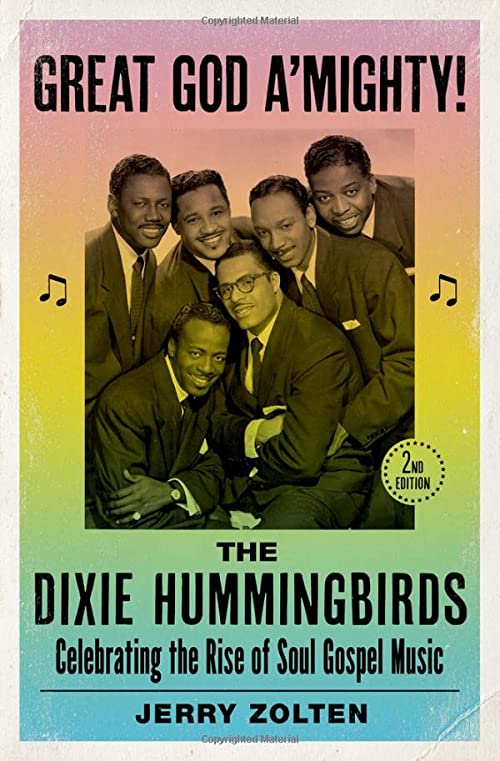
Jerry Zolten
Reviewed by: William Edgar
Great God A’Mighty! The Dixie Hummingbirds: Celebrating the Rise of Soul Gospel Music, by Jerry Zolten. Oxford University Press, 2022. Hardcover, 408 pages, $35.00 (Amazon). Reviewed by emeritus professor William Edgar.
Many won’t be familiar with the great “quartet style” developed by black gospel singers in the mid-twentieth century. Gospel developed out of the spiritual in a more upbeat, urban version. There were hundreds of these groups, including the Golden Gate, the Spirit of Memphis, the Five Blind Boys of Alabama and, of course, the Dixie Hummingbirds. If you are not familiar with this extraordinary ensemble, then put this magazine down and tune-in to YouTube’s or Spotify’s many recordings. Try the retrospective, “The Dixie Hummingbirds - 80 Years Young” on YouTube.
Zolten’s book is a labor of love. Thoroughly researched and faithful to its subject, it provides an eye-opening on several issues. For example, it is a window on race relations. Unless you have lived through it, it is hard to believe the amount of cruelty associated with segregation. Black audiences and white audiences could not listen together. Hotels were segregated. Blacks were not allowed in white restaurants. Many were denied ordinary schooling. Admirably, the “Birds” decided to endure all of this and get on with performing.
We learn a good deal about rampant poverty. Livings were scraped together by spirited mothers, and young people grew up with severe privations. Yet faith was usually there. Here is a telling comment by the marvelous singer Ira Tucker: “Gospel came from loneliness, bewilderedness, and short-changed in life, cursed out and knocked down and everything.” But he quickly adds, “And then, after all that, you go to church and thank God for another day” (57).
The story of the Birds is also a window onto American life in midcentury. For example, the advent of the radio was a major feature of the culture of the 1930s. Almost everyone listened to Roosevelt’s Fireside Chats, where the president explained the troubles of life during hard times. Black entertainment was an integral part of radio, including comedy and music. Performances and narratives were full of fun and humor. The singers obviously loved their audiences. But the central calling of the Birds, who could have risen to Ray-Charles-like stardom, was the gospel.
As might be expected, personnel changes occurred. The founding leader was James Davis, whom Zolten met and interviewed. He was a born leader and sang beautifully. Another superstar was Ira Tucker Jr., who came from a musical family that rubbed shoulders with the popular groups of the time. And there were others. But the extraordinary cohesiveness of the Birds came mostly from the consistency of its personnel. The life was grueling: four or five performances per day, travels on a bus, publicity. One admires the integrity of the singers in such a pressure cooker.
For readers not familiar with this manner of singing, they will be (pleasantly) surprised by the combination of traditional harmonies, syncopated rhythms and a use of the voice that is decidedly not European. Basses could go very low. Tenors easily soared into falsetto. The accord of the group was often assured by a cappella singing or by a simple guitar. There could be humor, or there could be sobering seriousness, depending on the theme. Every aspect of biblical truth was explored in song.
Zolten has provided a thorough guide to the Birds, including a couple of indexes, a fine bibliography, a discography, great photos, and abundant notes. Beautifully written, this is a real feast.
July 27, 2025
July 20, 2025
July 13, 2025
Proclaiming Christ in a Pluralistic Age
July 06, 2025
June 29, 2025
June 22, 2025
June 15, 2025
© 2025 The Orthodox Presbyterian Church